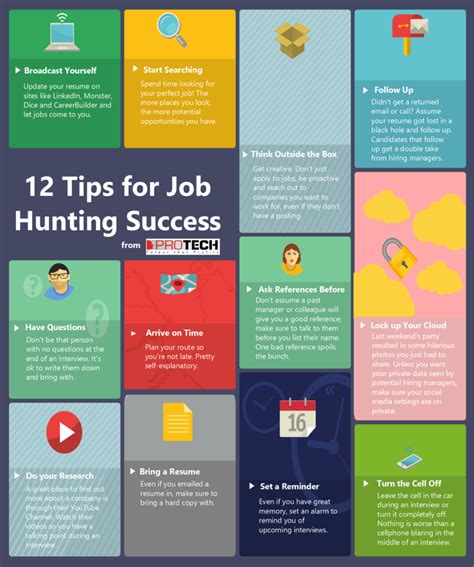Job-Hunting Strategies: 11 Effective Approaches

Looking for a job can be a challenging and overwhelming process. With so many applicants vying for the same positions, it’s important to have a solid job-hunting strategy in place. In this article, we will explore 11 effective approaches that can help you stand out from the competition and land your dream job. Whether you’re a recent graduate or a seasoned professional, these strategies will give you the edge you need to succeed.
1. Define Your Career Goals
Before you start your job search, it’s crucial to have a clear understanding of your career goals. Take some time to assess your skills, interests, and values to determine what type of work you enjoy and what you want to achieve in your career. This will help you focus your job search and target positions that align with your goals.
Example:
For instance, if you are interested in a career in marketing, you may want to pursue roles in brand management, digital marketing, or market research. By defining your career goals, you can narrow down your job search and tailor your application materials to showcase your relevant skills and experiences.
2. Create an Impressive Resume
Your resume is often the first impression a potential employer has of you, so it’s important to make it stand out. Tailor your resume to highlight your relevant skills, experiences, and accomplishments. Use action verbs and quantify your achievements to demonstrate your impact in previous roles.
Example:
Instead of simply stating that you managed a team, highlight how you successfully led a team of 10 employees to achieve a 20% increase in sales. Including specific details and results will make your resume more compelling and demonstrate your value to potential employers.
3. Network Effectively
Networking is a powerful tool in the job search process. Reach out to your professional contacts, attend industry events, and join online communities to expand your network. Make genuine connections and build relationships with professionals in your desired field.
Example:
Connect with professionals on platforms like LinkedIn and attend industry conferences and events to meet new people. Building a strong network can lead to job opportunities and provide valuable insights into the industry.
4. Utilize Online Job Boards
Online job boards are a great resource for finding job openings. Create profiles on popular job board websites and set up job alerts to receive notifications for relevant positions. Customize your resume and cover letter for each application to increase your chances of getting noticed.
Example:
Popular job board websites like Indeed, LinkedIn, and Glassdoor offer a wide range of job listings across various industries. Utilize the search filters to narrow down your options and find positions that match your skills and interests.
5. Leverage Social Media
Social media platforms can be powerful tools in your job search. Create a professional presence on platforms like LinkedIn and Twitter, and use them to showcase your skills, share industry insights, and connect with potential employers.
Example:
Post relevant articles, comment on industry discussions, and engage with professionals in your field. This will not only demonstrate your expertise but also increase your visibility to potential employers.
6. Attend Job Fairs and Career Events
Job fairs and career events are valuable opportunities to connect with employers face-to-face. Research upcoming events in your area and come prepared with copies of your resume and a brief elevator pitch about yourself.
Example:
Engage with employers, ask questions, and express your interest in their company. Follow up with a thank-you email or LinkedIn message to leave a lasting impression.
7. Consider Internships or Volunteer Work
Internships and volunteer work can provide valuable experience and help you build your professional network. Consider taking on internships or volunteer positions in your desired field to gain hands-on experience and make connections.
Example:
Reach out to non-profit organizations, start-ups, or local businesses that align with your career goals. Even if these positions are unpaid, they can provide valuable skills and experiences that will make you more marketable to future employers.
8. Develop Your Personal Brand
Your personal brand is how you present yourself to the professional world. Take the time to develop a strong personal brand that aligns with your career goals and values. This includes your online presence, professional image, and the way you communicate.
Example:
Create a professional website or blog to showcase your work and expertise. Share your knowledge through thought leadership articles or industry-specific content. Consistently presenting yourself in a professional and authentic manner will help you stand out from the competition.
9. Prepare for Interviews
Interviews are a crucial part of the job search process. Research the company and the role you’re applying for, and prepare answers to common interview questions. Practice your responses and come up with specific examples to demonstrate your skills and experiences.
Example:
Research common interview questions for your industry and practice answering them out loud. Ask a friend or family member to conduct a mock interview to help you prepare and provide feedback.
10. Follow Up After Interviews
After an interview, it’s important to follow up with a thank-you email or letter to express your appreciation for the opportunity. Use this as a chance to reiterate your interest in the position and highlight any key points you may have missed during the interview.
Example:
Send a personalized thank-you email to each interviewer within 24 hours of the interview. Mention something specific from the conversation to show that you were actively engaged and interested.
11. Stay Positive and Persistent
Job hunting can be a challenging process, but it’s important to stay positive and persistent. Rejections are common, but they should not deter you from pursuing your goals. Stay motivated, continue learning and improving, and keep pushing forward.
Example:
Remember that finding the right job takes time and effort. Stay positive, maintain a strong support system, and celebrate small victories along the way. With the right mindset and a strategic approach, you will eventually find the job that is the perfect fit for you.
Conclusion
Job hunting can be a daunting task, but with the right strategies in place, you can increase your chances of success. By defining your career goals, creating an impressive resume, networking effectively, and utilizing online resources, you can stand out from the competition and land your dream job. Remember to stay positive and persistent throughout the process, and never underestimate the power of a strong personal brand and a solid interview performance.
FAQs
-
How long does the job-hunting process usually take?
The job-hunting process can vary depending on various factors such as the job market, industry, and level of experience. On average, it can take anywhere from a few weeks to several months to secure a job offer.
-
Is it necessary to tailor my resume for each job application?
Yes, it is highly recommended to tailor your resume for each job application. This allows you to highlight the most relevant skills and experiences that match the requirements of the specific job you are applying for.
-
How important is networking in the job search process?
Networking is extremely important in the job search process. Many job opportunities are not publicly advertised, and networking can help you tap into the hidden job market. Building relationships with professionals in your desired field can also provide valuable insights and mentorship.
-
Should I follow up after submitting my application?
It is recommended to follow up after submitting your application, especially if you have not heard back within a reasonable timeframe. A polite email or phone call can demonstrate your continued interest in the position and remind the employer of your application.
-
How can I stay motivated during the job search process?
Staying motivated during the job search process can be challenging, but there are several strategies you can use. Set realistic goals, celebrate small victories, maintain a strong support system, and take breaks when needed to recharge and avoid burnout.

